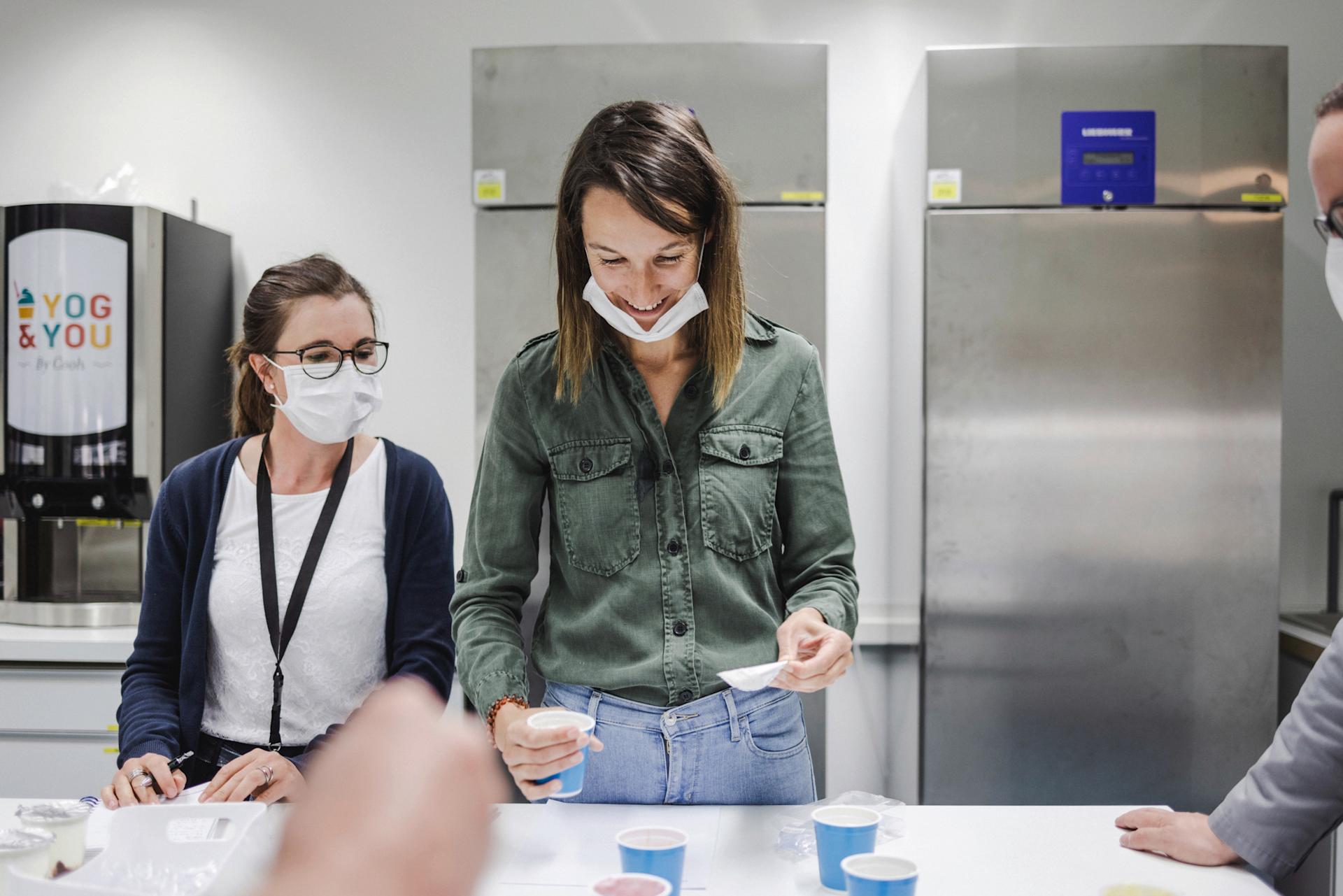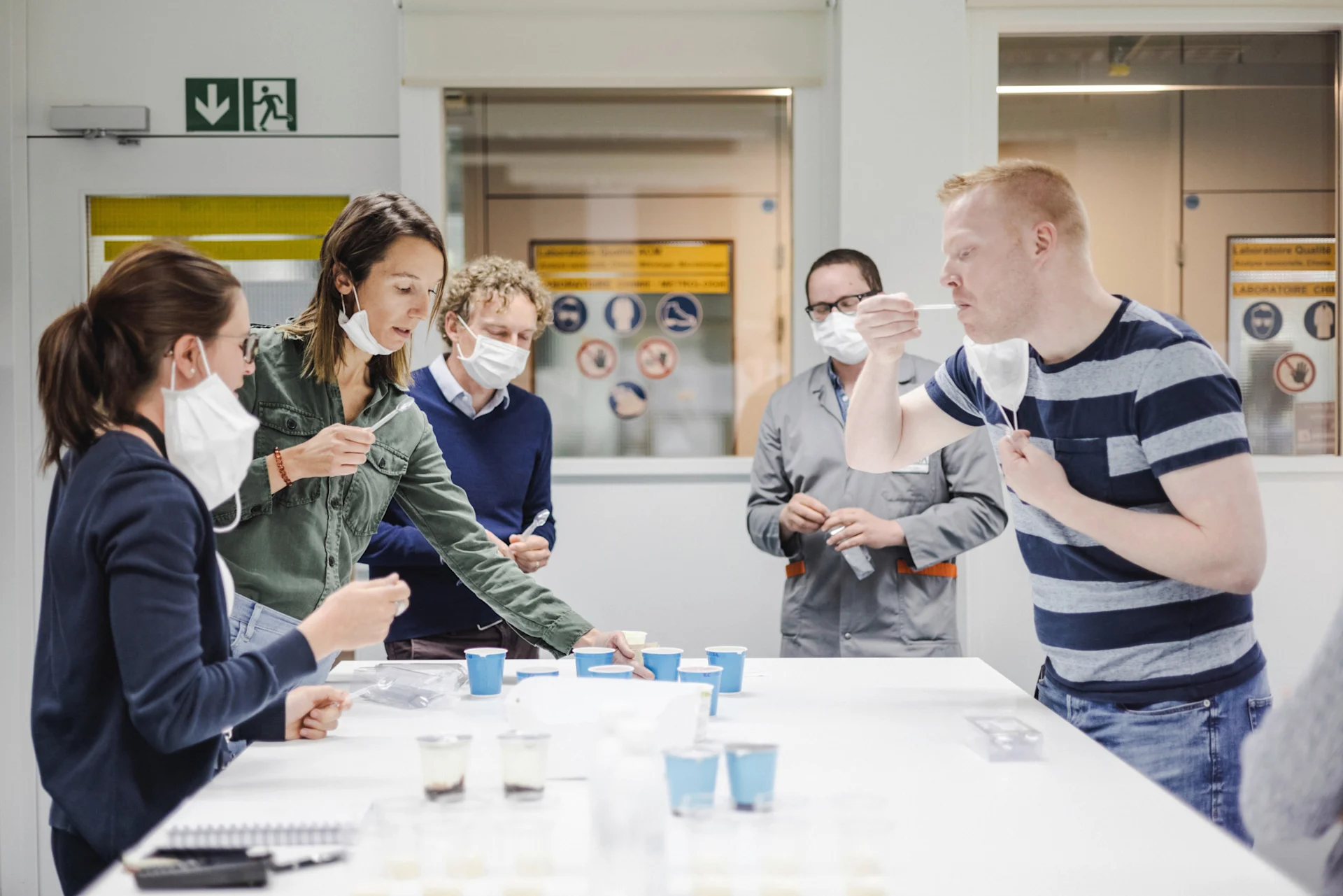
Sustainability
Do something good for CHF 0.50
If you buy a bar of "Côte d'Ivoire" chocolate, you will be contributing to a success story in West Africa.
navigation

Nutrition
By 2024, Migros yoghurts are required to contain 10 per cent less added sugar. Marion Paccard from the Development Team at Migros subsidiary Elsa is hard at work in the laboratory to ensure they still taste great.
For Marion Paccard, tasting the results of her experiments is all part of her workday routine. The 33-year-old development specialist is a member of the Innovation Team of the Dairy Business Unit at Elsa, a Migros subsidiary. At the product development laboratory in Estavayer-le-Lac in the Swiss canton of Fribourg, Paccard is researching ways to reduce the sugar content in yoghurt without having a negative impact on its quality, flavour or consistency.
And she is always the first to try out the new recipes.«It usually takes a couple of weeks’ lab work to develop a version suitable for testing by a wider audience,» says Paccard. Tasting is first performed in the laboratory, followed by the company kitchens, Marketing and other departments – and finally by a selected group of customers.
As a rule, Paccard varies the recipe for a yoghurt by trying out different combinations of fruit mixtures and bacterial cultures. For the reduced-sugar M-Classic yoghurt, which will soon be available in stores, the process took over a year. «It’s based around a sugar-sweetened natural yoghurt – the fruits are only added later,» explains Paccard. The level of sugar in the natural yoghurt was reduced in two phases: initially by five per cent, later by ten.

«This allows us to get our customers used to the reduced sugar content gradually,» says Sarah Gaille (31), Product Manager for Yoghurt at ELSA. For the blind testing, an agency recruited a panel of around 120 people who usually buy M-Classic yoghurt on a regular basis. «To our surprise, the version with less sugar was more popular than the sweeter original version right from the outset,» reports Gaille. «The testers also thought it brought out the flavour of the fruit more.»
As Paccard emphasises, only the amount of added sugar in the yoghurt is being reduced. Following this reduction, the total sugar content of M-Classic strawberry yoghurt is now 11 per cent. Out of this, 8.2 per cent is added sugar, with the remainder comprising natural sugars from milk and strawberries, which have not changed. When Paccard began her work in 2019, the amount of added sugar in this yoghurt was 9.2 per cent.
The recipes used for the fruit versions of the M-Classic range can all be changed by following the same approach. And, in this first step, Paccard didn’t have to do much more than simply reduce the amount of added sugar. However, the situation becomes more complex when making further reductions or for other yoghurt ranges, such as Excellence. «These are characterised by strong flavours that change significantly when we take out the sugar. Fortunately, we still have until 2024 to find a solution for this.»
Sometimes, cutting the amount of sugar also changes the product consistency, which Paccard must then balance out through other measures. And all this must be done without using artificial sweeteners to compensate for the reduction in sugar. «The ultimate aim is for the yoghurts to contain less sugar, but with such a small change to the overall experience that customers don't even notice,» says Gaille.
By signing up to the Milan Declaration, Migros – along with many other major food distributors – has committed to reducing the sugar content of its yoghurts by 10 per cent by 2024. This does, however, provide a certain amount of leeway for individual products as the reduction is based on the average value across all ELSA yoghurts. The previous figure of nine per cent added sugar is to be reduced to eight per cent by 2024.
Although Migros will continue to sell yoghurts that exceed this target, this will be balanced out by other yoghurts with less sugar, such as Migros organic fruit yoghurts that include no added sugar at all and instead have a higher fruit content. «The Excellence range, which is more of a dessert product, will continue to have over eight per cent added sugar in the future, although we will also be seeking to reduce this value,» says Gaille. Customers who prefer a sweet treat and are not concerned about sugar content will therefore still be able to find the right product for them.
For a development specialist like Marion Paccard, reducing the amount of sugar presents an interesting challenge. «And it provides an opportunity for me to gain valuable experience.» Since the drinks and quark products in the ELSA range are also in line to be made less sweet, the knowledge of what has worked well with yoghurts is sure to prove useful.
Excess sugar consumption is a significant contributory factor for many illnesses. And many processed foods contain sugar that is often not noticeable. In 2015, the major Swiss food distributors signed the Milan Declaration and committed to reducing the sugar content of yoghurt by 10 per cent and breakfast cereals by 15 per cent by 2024. Progress towards this goal is monitored on a regular basis, and plans are in place to extend the targets to additional products and to include salt as well as sugar.
Migros is also making progress towards cutting the sugar content of breakfast cereals. Between 2016 and 2018, it reduced the amount of added sugar across its entire own-brand range by 16.7 per cent. By the end of 2024, added sugar is to be reduced by a further 15 per cent compared to the end of 2018.
Discover exciting stories about all aspects of Migros, our commitment and the people behind it. We also provide practical advice for everyday life.